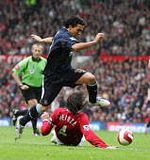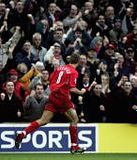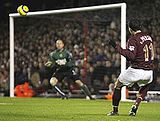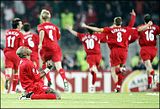The Salary Cap – a practical solution to the financial chasm threatening football
"the majority is fighting with spears, while the greedy few have the financial equivalent of nuclear warheads……." (Sepp Blatter).
Blatter’s verbal volley against the increasing financial gulf in English football has been greeted with widespread approval. Malcolm Clarke, who chairs the Football Supporters Federation, an organisation representing 130,000 fans, said, "Most supporters would find his remarks did strike a cord. The vast majority will say, good on Mr Blatter. If you went round the majority of pub going fans before a game and asked whether the top players are paid too much, whether agents are paid too much, whether tickets are too expensive, and whether Mr Abramovich is a force for good or bad, most people would agree with Mr Blatter." Mr. Clarke’s view is also shared by influential figures of the media. The peerless sports journalist Hugh McLlvanney wrote, "nobody can honestly question the destructive possibilities inherent in the unprecedented inequalities now disfiguring football."
The Facts
The ‘advent’ of Roman Abramovich has been the catalyst for this development. His unprecedented investment in Chelsea Football Club has bought a team of machine like efficiency, so good that certain bookmakers were prepared to pay-out on punters who had backed them for the title, only five weeks into the current season.
Analysis of Chelsea’s financial figures from last year illustrates the financial impact of Abramovich. His outlay has been staggering. In the 2003/2004 season, the club spent £175M on new players and more than doubled its annual pay roll to £115M. To put this into context, second place on the payroll list was Manchester United with £77M, while at the other end of the scale, the lowest spenders, West Bromich Albion, spent just £11.5M. In total, wages took up about 76% of Chelsea’s total income last year, beyond what is considered prudent in any business, even football. Overall, Chelsea made a record pre-tax loss of £88M. For almost any other British club such financial imbalance would be fatal. However, Chelsea had Mr Abramovich to underpin the club’s finances with a loan of £115M. Without his cash, Chelsea’s auditors, KPMG, would not have been able to sign off the business as a going concern.
This unprecedented level of investment has lead to an unprecedented lack of competition in the Premier League as Chelsea continue to dominate. To return to Blatter’s comments, "what is interesting about a League whose Champions can be predicted with confidence after about 5 games?"
Is intervention necessary?
Many commentators advocate a non-intervention approach, leaving football to market forces. Unfortunately football does not work like other markets. Entertainment is its principle selling point, and if this is in short supply, the market will inevitably dwindle. As Advocate General Lenz noted in his opinion on the Bosman case, if the League is clearly dominated by one team, the necessary tension is absent and the interest of spectators will thus probably lapse within a foreseeable period. It would seem that this slide is already in process, with this season’s spectator figures already down significantly on last season’s. Worse still, in the distance, looms the spectre of broadcasting rights re-negotiations in 2007 and the likelihood that the present lack of competition, in association with the European Union’s anti-monopoly intervention, will lower the amount of revenue to be gained from broadcasting rights and correspondingly available to be re-distributed amongst the clubs. While a significant downturn in this revenue would devastate the majority of Premier League clubs, it would be unlikely to make any serious inroads into Chelsea’s financial position, balanced as it is by a billionaire with near limitless funds. The prestige and other attractions associated with success ensures football’s ‘tycoons’ such as Abramovich at Chelsea, Morati at Inter and the late Jack Walker at Blackburn are prepared to bankroll, otherwise non-viable commercial entities. The outlook is therefore bleak, with no immediate prospect of the gap contracting.
The two forms of salary?
Although recent press debate has focussed on one form of salary cap, the hard cap it is important to recognise that a soft cap solution is also available and is in many ways preferable to its better known cousin.
The Hard Cap
This is essentially a uniformed ceiling for wage spending for every club and would represent a radical departure from the status quo. Wage capacity would become less important, increasing potential competition, while (in theory) restraining costs. A more open competition may in turn, attract increased broadcasting revenues, which, if re-distributed fairly, could narrow the gap further.
Sounds ideal? Unfortunately the reality is far from it. Several critical flaws mar the hard cap solution. In fact its greatest strength; potential wage spending equality is also its greatest weakness. No doubt the richer clubs, particularly those who have worked hard on and off the pitch to achieve financial success, would reject any proposal that the financial failures languishing below them, suddenly be granted the right to compete on an equal footing.
Another problem would be implementation, which would inevitably be a practical nightmare. One can envisage the top clubs, which are subject to numerous, existing, long-term contracts, finding it very difficult to reform their wage structures to conform to a new regime. A consequence of such reform would be forced sales and termination of contracts creating an artificially flooded market, also unfairly benefiting poorer clubs.
One must also consider the fact that, in a footballing climate where the Champions League has become the pre-eminent competition in club football, it is unlikely clubs would welcome a measure, which, unless introduced on a European wide basis, could have a significant effect on their ability to compete at that level. The Champions League is too significant, both financially and otherwise, to it’s English participants, for them to allow such an inequality to arise, especially considering that the ability of English clubs to pay high wages is currently one of their main advantages over the majority of their European competitors.
Even if a situation arose whereby the salary cap was implemented on a European wide basis, it would be impossible to factor currency fluctuations into the equation. There are clearly great economic designations between different countries and leagues in Europe. The economy in which Locomotive Moscow operates is very different to that in which AC Milan operates. £100, 000 is worth a lot more in Moscow than it would in Milan. Thus a cap set to Milan’s wage bill will be meaningless to Moscow and the opposite unfair on a team which comes from an area where the cost of living is expensive.
A final and perhaps most obvious flaw with the hard cap is the question of the level at which it would be set. If set at the level of the highest spender than the caps will have no effect. If at the lowest, the larger teams will be badly affected and have to sell players.
The Soft Cap
The second form of salary cap and that, which has not featured extensively in the public debate, is the soft cap. This is a relative limit on permissible salary payments, usually expressed as a percentage of the club’s total income.
The soft cap’s ‘relative’ element makes it a less radical departure from the status quo than the hard cap. While the soft cap restrains the negative effects of tycoon investment, it represents a fairer option for those clubs, which have worked hard to achieve their existing wage spending capacity. Efficiency and prudence would be rewarded, while financial mis-management, and unrealistic spending punished. Under the soft cap, it would be difficult to envisage a boom bust scenario, such as was experienced by Leeds United FC in the 2003/4 season.
Critics of the soft cap argue that all it does is crystallise relative strengths and weaknesses, which would otherwise fluctuate. In response, while the so called fluctuation in fortunes under a soft cap may not be as dramatic as it has been in recent years, the balance of power will inevitably shift over time. Even before the Abramovich era, Arsenal, despite lesser resources then their main competitor Manchester United, broke the latter’s dominance to rise to a position of pre-eminence, until Chelsea’s freakish financial capacity began to have its inevitable impact.
Another criticism is that without the ability to attract and reward new capital, any industry is doomed to fail and the football industry is no different. Again the critic is guilty of short-termism. While investment rewards may not be as immediate under the soft cap system, careful investment in a club’s infrastructure, stadium, youth development and supporters’ organisations in combination with prudent financial management and effective brand marketing, could over time produce substantial reward.
Is the salary cap legal under European Competition Law?
Article 81 (1) EC prohibits,
" All agreements between undertakings, decisions by associations of undertakings and concerted practices which may affect trade between member states and which have as their object or effect the prevention, restriction or distortion of competition within the common market…"
As an effective horizontal agreement between competitors as to how much they will spend on a key service, salary caps are prima-facie in breach of this rule and will therefore be void and un-enforceable as between parties, unless it can be justified under the conditions set out in Article 81 (3).
While it would be impossible for the majority of industries to provide such justification, the football industry is in a sense exceptional and as such, deserves special treatment as the Court of Justice recognised in Bosman and more recently in the ENIC case, which concerned the legality of UEFA’s rule preventing ownership of more than one club within its jurisdiction- like salary caps, prima facie a breach of Article 81.
In obiter, the Court chose to quote from Wouters to explain its reasoning,
"not every argument between Undertakings or any decision of an Association of Undertakings which restricts the freedom of action of the parties or one of them necessarily falls within the prohibition laid down in Article 81 (1) of the Treaty…….account must first be taken of the overall context of which the decision of the Association of Undertakings was taken or produces its effects. More particularly account must be taken of its objectives. "
Following this logic, the ratio of the ENIC case was whether the consequential effects of the "one club only rule" were inherent to the pursuit of the very existence of credible pan European football competitions. In the Court’s eyes, the rule was inherent to this goal and therefore couldn’t be considered a restriction of competion. It was necessary as, "The public’s perception that the underlying sporting competion is fair and honest is an essential precondition to keep…interest and marketability"
Proportionality
Thus essentially, the issue is reduced to a question of proportionality- is the salary cap/ restriction reasonably related to a legitimate objective and proportionate to that end? This was the ratio of the Bosman case, where the previous transfer rules were held to be illegal, because it was considered that there were less restrictive means of achieving its goals.
Previous analysis on this issue with regards to salary caps has all taken place in the pre-Abramovich era and thus tended to focus on the continued financial viability of smaller clubs as a possible justification for its introduction. This argument has always suffered the battering ram of proportionality, because it could be coherently argued that more effective distribution of income would be a more proportionate method of keeping the smaller clubs afloat.
Post Abramovich, the goalposts have clearly moved and with them the probable justification for a salary cap. Now financial viability is simply part of a larger, competitive balance justification. While it is likely that more effective re-distribution of income would once again be forwarded as a more proportionate means of dealing with the problem, in a market where one competitor has the benefit of an unprecedented financial backing to the extent that it does not need to be commercially viable, it is unlikely that a fairer redistribution of income would make the slightest bit of difference and in fact, by probably reducing the income of Chelsea’s main competitors, could even have the effect of exaggerating their dominance. This represents a case in point of how football is different from the majority of other industries. In few other industries would an £88 million loss would be acceptable. In terms of his interest in Chelsea, Abramovich is a Medici like patron, whose motivation is not financial profit but profit in other spheres.
Other legal obstacles
Even if the salary cap were deemed to be a proportionate response to the problems faced by football, it would further have to overcome the common law doctrine of restraint of trade and European law of free movement of persons, the rule under which Bosman succeeded in challenging the transfer rules. Dealing first with the former, those seeking to challenge the salary cap would simply have to identify it as a restriction on trade. If they were successful the onus would then shift upon the defendant to demonstrate that the restriction is reasonable. Thus we are returned to the question of whether it was a restriction reasonably related to a legitimate objective and proportionate to that end and I would suggest that if a salary cap can be successfully justified for the purpose of Article 81, it would likewise be justified under the doctrine of restraint of trade.
Likewise the second potential obstacle: the free-movement of persons rules. The majority of analysis on the issue of salary caps does not really consider this subject, having made the assumption that a salary cap is not a restriction on the free movement of a player. What about a situation where a club makes an offer to a player, but is forced to retract on this offer to avoid breaching the terms of the salary cap. In this scenario the salary cap would represent a fundamental restriction on the right under Article 39 (3) to accept an offer of employment actually made. This is a situation, which one can easily imagine clubs in opposition to the salary cap seeking to contrive. However, as we have already seen in his opinion on the Bosman ruling, Advocate General Lens recognised that certain restrictions agreed under the auspices of a sports governing body are lawful if they are necessary to ensure by means of specific measures that certain balances preserve between the clubs. Thus once again, the test is proving that the salary cap is a restriction reasonably related to a legitimate objective and proportionate to that end and once again I believe that if the salary cap passed the Article 81 Test, it would pass this test also.
In conclusion, while it is clear that action needs to be taken in order to restrict the anti- competitive impact of tycoon investment on top flight football and it is also clear that a soft cap would be an would be the most appropriate method of restriction, it remains to be seen whether the European Court of Justice would accept its implementation. While it has recently shown a certain degree of leniency over sporting restrictions, as its approach to sport has fluctuated in the past, so it may continue to fluctuate in the future and as such, it is impossible, even with the most detailed legal analysis, to anticipate fully the outcome of any challenge to a soft cap restriction.
One thing we can be sure of however is that if a restriction were to be implemented, if would be vigorously challenged, particularly by those on whom it has the greatest impact. Do the prevailing football authorities have the stomach for such a fight?
Alistair Maiden



 EFT match of the season for 2008/2009: Barcelona construct a masterclass footballing performance to defeat the reigning Champions League holders and current English champions, Manchester United, by a scoreline of 2-0 in the 2009 Champions League final in Rome
EFT match of the season for 2008/2009: Barcelona construct a masterclass footballing performance to defeat the reigning Champions League holders and current English champions, Manchester United, by a scoreline of 2-0 in the 2009 Champions League final in Rome EFT player of the season for 2008/2009: Chelsea central midfielder, Frank Lampard
EFT player of the season for 2008/2009: Chelsea central midfielder, Frank Lampard EFT player of the month for May 2009: Nicolas Anelka (Chelsea)
EFT player of the month for May 2009: Nicolas Anelka (Chelsea) EFT player of the month for April 2009: Andrey Arshavin (Arsenal)
EFT player of the month for April 2009: Andrey Arshavin (Arsenal) EFT player of the month for March 2009: Steven Gerrard (Liverpool)
EFT player of the month for March 2009: Steven Gerrard (Liverpool) EFT player of the month for February 2009: Phil Jagielka (Everton)
EFT player of the month for February 2009: Phil Jagielka (Everton) EFT player of the month for January 2009: Nemanja Vidic (Man Utd)
EFT player of the month for January 2009: Nemanja Vidic (Man Utd) EFT player of the month for December 2008: Steven Gerrard (Liverpool)
EFT player of the month for December 2008: Steven Gerrard (Liverpool) EFT player of the month for November 2008: Nicolas Anelka (Chelsea)
EFT player of the month for November 2008: Nicolas Anelka (Chelsea) EFT player of the month for October 2008: Dirk Kuyt (Liverpool)
EFT player of the month for October 2008: Dirk Kuyt (Liverpool) EFT player of the month for September 2008: Frank Lampard (Chelsea)
EFT player of the month for September 2008: Frank Lampard (Chelsea) EFT player of the month for August 2008: Amr Zaki (Wigan Athletic)
EFT player of the month for August 2008: Amr Zaki (Wigan Athletic) EFT match of Euro 2008: Turkey's amazing comeback from two goals down to beat Czech Republic 3-2 as captain Nihat Kahveci's two goals in the last three minutes sensationally put his country through to the quarter finals at the expense of their beaten opponents
EFT match of Euro 2008: Turkey's amazing comeback from two goals down to beat Czech Republic 3-2 as captain Nihat Kahveci's two goals in the last three minutes sensationally put his country through to the quarter finals at the expense of their beaten opponents EFT player of Euro 2008: Spain (anchor) central midfielder, Marcos Senna
EFT player of Euro 2008: Spain (anchor) central midfielder, Marcos Senna
 EFT match of the season for 2007/2008: Liverpool win titanic Champions League quarter-final second leg 4-2 against Arsenal that also saw two of the best football moments of the season - Fernando Torres' top corner strike and Theo Walcott's thrilling run across the whole of Anfield.
EFT match of the season for 2007/2008: Liverpool win titanic Champions League quarter-final second leg 4-2 against Arsenal that also saw two of the best football moments of the season - Fernando Torres' top corner strike and Theo Walcott's thrilling run across the whole of Anfield. EFT player of the season for 2007/2008: Cristiano Ronaldo (Manchester United)
EFT player of the season for 2007/2008: Cristiano Ronaldo (Manchester United) EFT player of the month for May 2008: Cristiano Ronaldo (Manchester United)
EFT player of the month for May 2008: Cristiano Ronaldo (Manchester United) EFT player of the month for April 2008: Ashley Young (Aston Villa)
EFT player of the month for April 2008: Ashley Young (Aston Villa) EFT player of the month for March 2008: Fernando Torres (Liverpool)
EFT player of the month for March 2008: Fernando Torres (Liverpool) EFT player of the month for February 2008: David James (Portsmouth)
EFT player of the month for February 2008: David James (Portsmouth) EFT player of the month for January 2008: Ronaldo (Manchester United)
EFT player of the month for January 2008: Ronaldo (Manchester United) EFT player of the month for December 2007: Roque Santa Cruz (Blackburn Rovers)
EFT player of the month for December 2007: Roque Santa Cruz (Blackburn Rovers) EFT player of the month for November 2007: Steven Gerrard (Liverpool)
EFT player of the month for November 2007: Steven Gerrard (Liverpool) EFT player of the month for October 2007: Wayne Rooney (Manchester United)
EFT player of the month for October 2007: Wayne Rooney (Manchester United) EFT player of the month for September 2007: Francesc Fabregas (Arsenal)
EFT player of the month for September 2007: Francesc Fabregas (Arsenal) EFT player of the month for August 2007: Fernando Torres (Liverpool)
EFT player of the month for August 2007: Fernando Torres (Liverpool)

 EFT player of the month for May 2007: Carlos Tevez (West Ham Utd)
EFT player of the month for May 2007: Carlos Tevez (West Ham Utd) EFT player of the month for April 2007: Wayne Rooney (Manchester Utd)
EFT player of the month for April 2007: Wayne Rooney (Manchester Utd) EFT player of the month for March 2007: Carlos Tevez (West Ham Utd)
EFT player of the month for March 2007: Carlos Tevez (West Ham Utd) EFT player of the month for February 2007: Cristiano Ronaldo (Manchester Utd)
EFT player of the month for February 2007: Cristiano Ronaldo (Manchester Utd) EFT player of the month for January 2007: Thierry Henry (Arsenal)
EFT player of the month for January 2007: Thierry Henry (Arsenal) EFT player of the month for December 2006: Cristiano Ronaldo (Manchester Utd)
EFT player of the month for December 2006: Cristiano Ronaldo (Manchester Utd) EFT player of the month for November 2006: Didier Drogba (Chelsea)
EFT player of the month for November 2006: Didier Drogba (Chelsea) EFT player of the month for October 2006: Jussi Jaaskelainen (Bolton Wanderers)
EFT player of the month for October 2006: Jussi Jaaskelainen (Bolton Wanderers) EFT player of the month for September 2006: Andrew Johnson (Everton)
EFT player of the month for September 2006: Andrew Johnson (Everton) EFT player of the month for August 2006: Nwankwo Kanu (Portsmouth)
EFT player of the month for August 2006: Nwankwo Kanu (Portsmouth) EFT match of World Cup 2006: Italy win a thrilling 'end-to-end' World Cup semi-final 2-0 against Germany courtesy of two late extra time goals from Fabio Grosso and Alessandro del Piero
EFT match of World Cup 2006: Italy win a thrilling 'end-to-end' World Cup semi-final 2-0 against Germany courtesy of two late extra time goals from Fabio Grosso and Alessandro del Piero  EFT player of World Cup 2006: Italy captain and centre-back, Fabio Cannavaro
EFT player of World Cup 2006: Italy captain and centre-back, Fabio Cannavaro
 EFT match of the season for 2005-2006: Liverpool win the FA Cup final 3-1 on penalties against West Ham after a Steven Gerrard-led fighback saw the Anfield side recover from 2-0 and 3-2 down to level the match in normal time
EFT match of the season for 2005-2006: Liverpool win the FA Cup final 3-1 on penalties against West Ham after a Steven Gerrard-led fighback saw the Anfield side recover from 2-0 and 3-2 down to level the match in normal time

 EFT player of the month for May 2006: Steven Gerrard (Liverpool)
EFT player of the month for May 2006: Steven Gerrard (Liverpool)
 EFT player of the month for April 2006: Jamie Carragher (Liverpool)
EFT player of the month for April 2006: Jamie Carragher (Liverpool) EFT player of the month for March 2006: Robbie Keane (Tottenham Hotspur)
EFT player of the month for March 2006: Robbie Keane (Tottenham Hotspur) EFT player of the month for February 2006: Aiyegbeni Yakubu (Middlesbrough)
EFT player of the month for February 2006: Aiyegbeni Yakubu (Middlesbrough) EFT player of the month for January 2006: Jason Roberts (Wigan Athletic)
EFT player of the month for January 2006: Jason Roberts (Wigan Athletic) EFT player of the month for December 2005: Steven Gerrard (Liverpool)
EFT player of the month for December 2005: Steven Gerrard (Liverpool) EFT player of the month for November 2005: Robin van Persie (Arsenal)
EFT player of the month for November 2005: Robin van Persie (Arsenal) EFT player of the month for October 2005: Frank Lampard (Chelsea)
EFT player of the month for October 2005: Frank Lampard (Chelsea)
 EFT player of the month for September 2005: Danny Murphy (Charlton Athletic)
EFT player of the month for September 2005: Danny Murphy (Charlton Athletic) EFT player of the month for August 2005: Wayne Rooney (Manchester Utd)
EFT player of the month for August 2005: Wayne Rooney (Manchester Utd) EFT match of the season for 2004-2005: Liverpool win Champions League final 3-2 on penalties against AC Milan after sensationally recovering from 3-0 down to level the match in normal time
EFT match of the season for 2004-2005: Liverpool win Champions League final 3-2 on penalties against AC Milan after sensationally recovering from 3-0 down to level the match in normal time



3 Comments:
Thank you Alistair for providing us with a copy of your draft written opinion on the legal and practical components inherent to the concept and potential application of the salary cap.
This is an important and highly relevant article in the current context of Chelsea's domineering impact on domestic football.
I agree with your opinion that the 'soft cap' option should be looked at closely by the authorities as a proportionate measure to ameliorate the excesses of clubs who acquire masssively rich and benovelent owners.
Fair, meritorious competition is not achieved by allowing any club to excessively spend at will with no reference to their actual income.
However, I regretfully doubt whether the relevant authorities are prepared to commit themselves to analysing and dealing with this problem; or even to recognise it as a problem in the first place.
Good luck with the plans you have for your draft opinion Alistair, and thanks again for permitting EFT to publish it here.
12/15/2005 11:38 am
Thank you, Alistair, a very in-depth article on European Law and and its further application onto the national game.
A lot of what I wish to say in response has been mentioned in detail already, in that European Law would consider any restraint of trade and contravention of Article 81 implications before a suggestion of a wage cap introduction. A good idea in theory, and then this is where good ideas can usually end. I haven't an argument against the idea, I suspect many opinions here in England would be that the financial investments levels are that which add more competitiveness to the game. 'You wish to compete financially and academically, improve yourself', I imagine majority opinions saying.
If or when a wealthy investor is accepted and invests into a club, that doesn't necessarily mean huge finances that pave the way for big spendings on signings that bring league domination and many trophies. Taking Chelsea for example (many have done and still do), Abramovich's fundings for the big purchases of players still meant the players had to be those who could gel and play together, not bought for their individual skills and flair and then found to have nothing in common with each other.
But certainly having the kind of financial backing to practically purchase who you want, were they to be available, is very, very helpful. Yet, consider the words of Wigan's Paul Jewell:
"When you have got the money to spend you have to spend it wisely. If you don't and you bring in the wrong type of players you get the sack. Money itself brings pressure."
Wigan spent something in the region of £75m when they were promoted last season, same season Chelsea spent more than double that amount. Yet in their first game Wigan nearly pulled off something which many in the Premiership merely dreamt about. Drawing a clean sheet with Chelsea, particularly in the first game of the season, if not coming close on occasion to winning. This is why I feel at times Jose Mourinho is seen to be snappy at his players, because they are formed to be a formidable team with a number of goals from a high expense, and at times he feels they are not playing as such. I refer to half-time at the JJB stadium as one example. On paper, Wigan were not meant to be holding them like that.
So it is arguable that big spending on players is not necessarily a guaranteed way forward, the concept of underdogs and overdogs can sometimes provide that type of shock of a better team on paper being beaten. Therfore it can be argued that a wage cap is not necesary in a game where practically the better you are the longer you survive. Again, that is not my opinion, but one I feel is one shared by many. Man City were not formed from such a budget yet were the only team to beat Chelsea in the league last season. Man Utd this season, so far. I can imagine, however, a number of Premiership managers voicing their support for a wage cap.
RedsMan.
12/16/2005 3:13 am
I take your analysis on board BJ, but is it fair to say that the present uncapped approach produces a greater chasm in inequality than one potentially created by a soft-cap option?
Meaning no disrespect against your team, but Chelsea have dramatically highlighted the consequences of unchecked spending. I agree with the opinion that money is not all that is needed to reach the top... but it is also fair to say that Chelsea would not be in the dominant position they currently hold if they didn't have a billionaire patron take over the club.
What I'm concerned about is that other clubs may also look abroad for mega financial investment to compete with Chelsea, as rumoured that Liverpool, West Ham, and Aston Villa have all done. I simply don't like this prospect- initiated by the impact of Abramovich's entrance into football- and would like to entrench the traditional idea of looking to achieve success through the symbiotic process of wise budgeting and progress on the pitch.
The soft-cap option for me looks to have the great merit of promoting this latter approach. It should also ensure more meritorious competition because there would be a block placed on those few clubs who can simply spend,spend,spend their way to the top. My own initial conclusion is that these conditions favour fair competition more than the conditions currently prevailing.
One thing for sure: the impact of Abramovich has significant ramifications for football and I would hope the FA are closely analysing whether or not anything should be done about it.
12/16/2005 6:39 pm
Post a Comment
<< Home